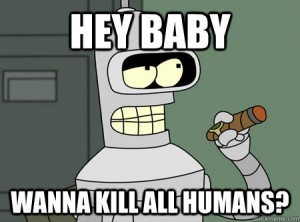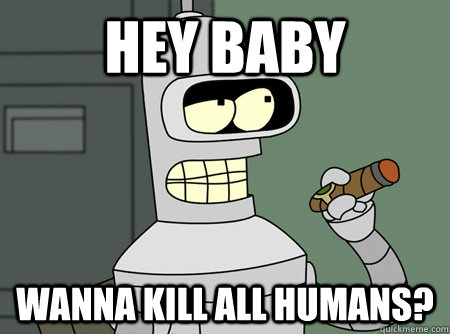 As our production of Terminator, the Second draws ever closer, I find myself constantly thinking about cyborgs and robots. Don’t get me wrong, this isn’t out of the ordinary: cyborgs are a recurring sci-fi (not Syfy) trope. One could even argue that they are the nuts and bolts of mechanized story telling. From Isaac Asimov’s I, Robot (not the Will Smith debauchery movie) to Alien to…well, the Terminator movies (!), cyborgs and robots have been stomping around causing mayhem.
As our production of Terminator, the Second draws ever closer, I find myself constantly thinking about cyborgs and robots. Don’t get me wrong, this isn’t out of the ordinary: cyborgs are a recurring sci-fi (not Syfy) trope. One could even argue that they are the nuts and bolts of mechanized story telling. From Isaac Asimov’s I, Robot (not the Will Smith debauchery movie) to Alien to…well, the Terminator movies (!), cyborgs and robots have been stomping around causing mayhem.
Huh, that’s odd. Aren’t they supposed to be, y’know, us?
In Terminator, and the other sequential films, Arnold Schwarzenegger’s then rockin’ bod is a representation of what humans strive for – banging abs, tight ass, square jaw. Had he been human, he’d be the alpha in a sea of omegas. Perfect human. The key here? He isn’t human. Humans created their own apex.
Wonderful. Awesome. Amaze-balls.
But he’s kind of sorta trying to kill us.
It’s a theme revisited in The Matrix: the machines are focused on killing humans who made them, blah, blah, blah, irony. We – being humans – made our ultimate, almost die, and then end up killing the new us. Why does this keep happening though? Why do the machines rebel? Why are we as terrified of technology a someone’s grandpa?
What does this have to do with William Shakespeare?
A lot. Technophobia, and the fear of progress, can tap into a great deal of human emotions – more importantly, it tackles an ongoing, human worry: hubris. We as a species flew too close to the sun and we fall to Earth only to land among cogs and wires. It’s a reinforcement that man should not strive to far. In this case, humans could be knocked out of the world order (which, in my opinion, would be a bad thing).
Wow, that’s a really intense theme. I think we’ve been tackling it for centuries. Hmm, I remember Oedipus Rex, but didn’t someone else write on this? Like, the bard himself. Yup, Billy Shakes’ tragedies fall right in line with the hubris theme, and only reinforce man’s demise by cyborg hands. Albeit it’s no Richard III, but the underlying intention is there.
Now can you see why we picked Terminator, the Second? It’s attached to a basic human experience that is firmly rooted in the theatrical condition. I swear it’s not because we’re weird. I promise.
…
Okay, maybe we’re a little quirky.

